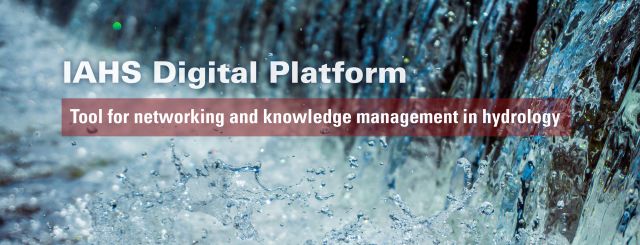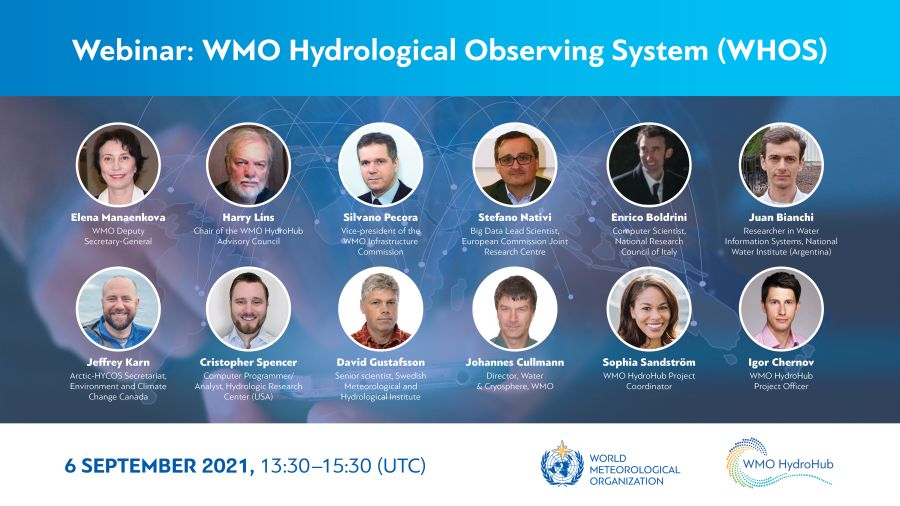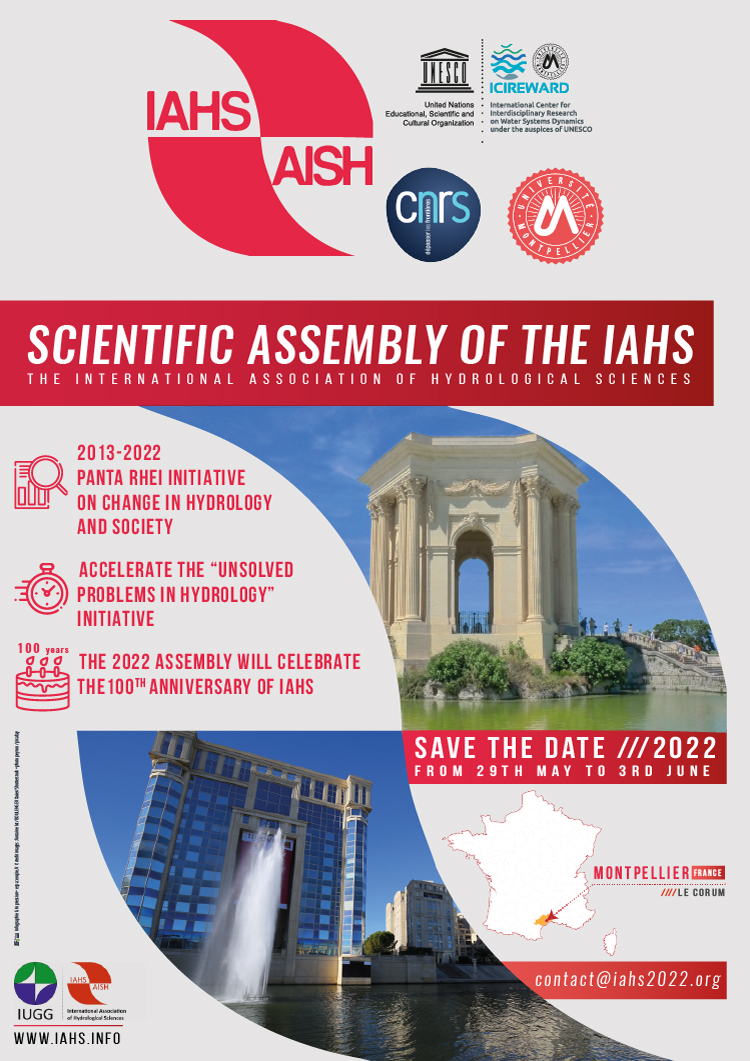IAHS News
Notice of WMO Hydrological Observing System (WHOS) Webinar
As a partner to WMO, IAHS would like to draw your attention to the upcoming free webinar on hydrological observations and the related free access paper on e-monitoring the nature of water in HSJ by Pecora & Lins https://www.tandfonline.com/doi/full/10.1080/02626667.2020.1724296 .
The critical need for hydrological observations in support of water resources management, particularly during extreme events, has transformed traditional methods of hydrological data management. This transformation has given rise to a framework of e-monitoring the hydrological cycle, the aim of which is to improve understanding of the nature of water.
The WMO Hydrological Observing System (WHOS) was designed around the integration of observations, data exchange, research, data processing, modelling and forecasting, in such a way that societal needs for disaster risk reduction, improved sustainability of environmental resources, climate resilience and economic growth can be effectively met. With its implementation of conceptual functionalities for sustainable data management, the WHOS operational architecture is hydrology’s system for the future.
This webinar is organized in frame of the WMO HydroHub End-of-Phase communication and will present some of the highlights and achievements of the WHOS development and implementation. More specifically, the webinar will allow participants to learn more about importance of data interoperability, WHOS concept and objectives, WHOS brokering approach, WHOS regional prototypes as well as WHOS data use cases.
Day and time: 6 September 2021, 13:30-15:30 (UTC)
Zoom meeting details: https://wmo-int.zoom.us/j/89015398603
IAHS Scientific Assembly 2022
Dear all,
The organisation of the XIth Scientific Assembly of the International Association of Hydrological Sciences (IAHS 2022) is going according to plan!
We are pleased to confirm that the assembly will be held at the Corum in the city centre of Montpellier, France from 29 May to 3 June 2022.
The call for abstracts and registration will open in September 2021.
In the meantime, please find attached the latest scientific and workshop programmes.
You can find more information on the IAHS 2022 website or follow us on Linkedin or Facebook.
Best regards,
IAHS-AISH 2022 Local Organizing Committee
www.iahs2022.org 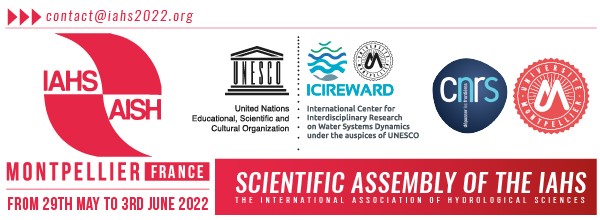
Change of Officers of IAHS
The election of Officers of IAHS and its 10 Commissions occurs every four years during the IUGG General Assembly. The most recent elections were held in Montréal in 2019. The offices are held for the period 2019-2023, except for the Presidents who were elected in 2019 and whose mandate is 2021-2025. In July 2021 the Presidents became Past-Presidents and the Presidents-Elect became Presidents.
Ordinarily the transition to new president will occur during the IAHS Scientific Assembly. However, due to the Coronavirus pandemic the 2021 Scientific Assembly has been delayed until 2022 and therefore the transition was confirmed during the recent online IAHS Bureau meeting.
With immediate effect the new officers are as follows:
| IAHS | President | Berit Arheimer | Sweden |
| Past-President | Günter Blöschl | Austria | |
| ICCE | President | Paolo Porto | Italy |
| Past-President | Adrian Collins | UK | |
| ICCLAS | President | Richard Petrone | Canada |
| Past-President | Harald Kunstmann | Germany | |
| ICGW | President | Felipe de Barros | Brazil / USA |
| Past-President | Aldo Fiori | Italy | |
| ICRS | President | Amir AghaKouchak | Iran / USA |
| Past-President | Yangbo Chen | China | |
| ICSH | President | Elena Volpi | Italy |
| Past-President | Ashish Sharma | Australia | |
| ICSIH | President | Melody Sandells | UK |
| Past-President | Tobias Jonas | Switzerland | |
| ICSW | President | David Hannah | UK |
| Past-President | Gil Mahé | France | |
| ICT | President | Zhonghe Pang | China |
| Past-President | Christine Stumpp | Germany / Austria | |
| ICWQ | Co-President (2021-2023) | Elango Lakshmanan | India |
| Co-President (2023-2025) | Xiaohong Chen | China | |
| Past-President | Wouter Buytaert | Belgium / UK | |
| ICWRS | President | Barry Croke | Australia |
| Past-President | Andreas Schumann | Germany | |
| Panta Rhei | 5th Biennium Chair | Heidi Kreibich | Germany |
| 4th Biennium Chair | Fuqiang Tian | China |
We welcome the new Presidents to their post and look forward to an exciting time at IAHS as we celebrate 100 years since the founding of the Association in Rome in 1922, and to the IAHS 2022 Scientific Assembly in Montpellier, France with a focus on the Unsolved Problems in Hydrology initiative and the end of the decade of Panta Rhei.
New Impact Factor for HSJ
On 30th June 2021, the 2020 Journal Citation Reports® were released by Clarivate Analytics.
We are delighted to announce that, according the 2020 JCR, Hydrological Sciences Journal (https://www.tandfonline.com/toc/thsj20/current) ranks in the top quartile of Water Resources journals (24/98) with an Impact Factor of 3.787 and a five-year Impact Factor of 3.5.
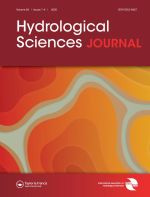
As the official journal of the IAHS, HSJ is the main vehicle and outlet for IAHS-led agenda-setting and cooperation initiatives, which has resulted in community key papers such as (recent examples):
· Nardi, F., et al., 2021. Citizens AND HYdrology (CANDHY): conceptualizing a transdisciplinary framework for citizen science addressing hydrological challenges, Hydrological Sciences Journal, DOI: 10.1080/02626667.2020.1849707
· Blöschl, G., et al., 2019. Twenty-three unsolved problems in hydrology (UPH) – a community perspective, Hydrological Sciences Journal, 64:10, 1141-1158. DOI: 10.1080/02626667.2019.1620507
· Tauro, F., et al., 2018. Measurements and Observations in the XXI century (MOXXI): innovation and multi-disciplinarity to sense the hydrological cycle, Hydrological Sciences Journal, 63:2, 169-196. DOI: 10.1080/02626667.2017.1420191
· Ceola, S., et al., 2016. Adaptation of water resources systems to changing society and environment: a statement by the International Association of Hydrological Sciences, Hydrological Sciences Journal, 61:16, 2803-2817, DOI: 10.1080/02626667.2016.1230674
The Journal also publishes special issues and virtual special issues, for example:
· Volume 65, Issue 5 Hydrological data: Opportunities and barriers (Part 1), 2020, Guest editor: Christophe Cudennec (link: https://www.tandfonline.com/toc/thsj20/65/5?nav=tocList)
· S2 Panta Rhei Opinion Paper Series: a list of opinion papers, discussions and replies (2017-) Guest editor: Heidi Kreibich (link: https://www.tandfonline.com/toc/thsj20/65/S2?nav=tocList)
· More information on other virtual special issues can be found at:
https://www.tandfonline.com/action/journalInformation?show=specialIssues&journalCode=thsj20
Such papers attract attention and contribute directly to the impact factor of the Journal.
The rise in HSJ’s impact factor and ranking is particularly good news as it has the potential to further amplify the visibility and strengthen the dissemination of the scientific research activities carried out internationally.
Our congratulations and sincere thanks go to the HSJ Editorial Office and Editors, Associate Editors and Reviewers for all their hard work for the journal.
First call for abstracts for WaterNet Symposium
Abstract submission and registration has been opened for the 22nd WaterNet/WARFSA/GWP-SA Symposium on 'Integrated Water Resources Management for Sustainable Development in Eastern and Southern Africa'. This will be a blended event held both virtually and at Victoria Falls in Zimbabwe with reduced registration rates for online attendance.
More information can be found in the conference flyer or on the website https://www.waternetonline.org/downloads/proceedings
The meeting will include a special session of ICWRS on the Unsolved Problems in Hydrology (UPH) initiative with an African perspective in preparation for the IAHS 2022 Scientific Assembly in Montpellier.
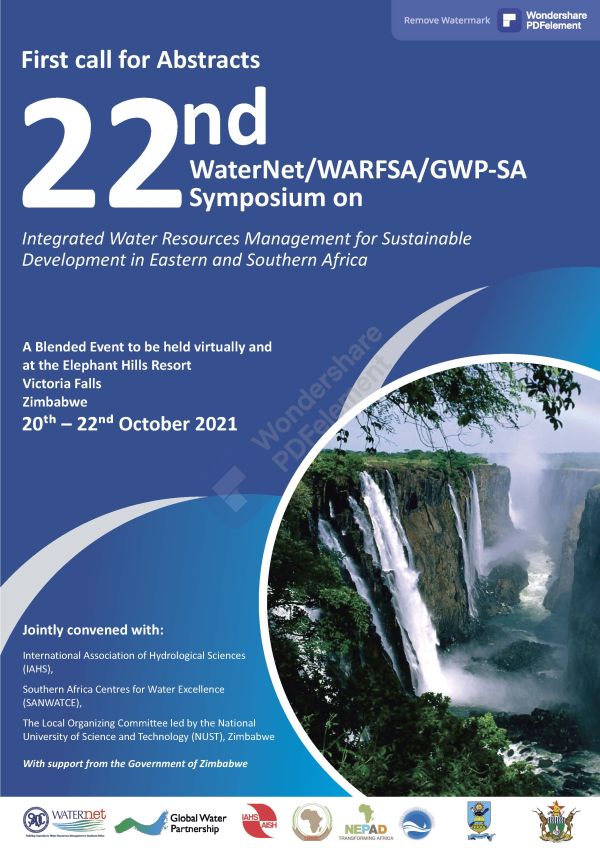
Important Dates
Deadline for submission of abstracts 20 July 2021
Deadline for early bird registration 15 August 2021
IAHS2022 Scientific Assembly Scientific Programme Now Available
The Scientific Assembly of the International Association of Hydrological Sciences (IAHS 2022) will take place in Montpellier, France from 29 May to 3 June 2022.
The scientific programme is available at http://www.iahs2022.org/program.asp
This important biennial event will provide an opportunity to communicate, exchange and project on all major topics in the hydrological sciences within the framework of sessions organized by all IAHS Commissions and Working Groups with partners.
IAHS 2022 will have three major focuses:
· Panta Rhei decade (2013-2022) on change in hydrology and society
· UPH initiative, "Unsolved Problems in Hydrology"
· the 100th anniversary year of IAHS
This event will be accompanied throughout this week by many other "water-related" events for scientists, the general public and schoolchildren.
Updated information on the STAHY 2021 International Workshop
The eleventh edition of the STAHY International Workshop, STAHY 2021, finally will be online, in order to eliminate any uncertainty concerning its development, and with reduced registration fees.
This event is organized by the International Commission on Statistical Hydrology (ICSH), of the International Association of Hydrological Sciences (IAHS), and the Research Institute of Water and Environmental Engineering (IIAMA) of the Universtat Politècnica de València (UPV).
Submissions are OPEN and can be made via the STAHY-2021 website https://stahy2021.congresos.upv.es/registration/
General topics include:
· Extreme hydrological and meteorological analysis under global changes
· Quantifying uncertainty in hydrological predictions
· Hydrological design and risk assessment under changing environment
· Applications of big data, data mining and information theory
· Data assimilation for hydrological forecasts
· New approaches in time series analysis
· Spatio-temporal variability and scaling
· Geostatistics in groundwater and surface hydrology
Best presentations will be invited to a Special Issue in Hydrological Sciences Journal.
It is also noteworthy that during the Workshop Prof. Jose Salas will receive the ICSH Achievement Award for his giant and outstanding contribution to the science of Statistical Hydrology.
One day before the Workshop (15 September), the traditional Early Career Course will take place, which will be entirely free for all those registered in the Workshop.
Important dates:
· Abstract submission deadline: June 30, 2021
· Notification of abstract acceptance: July 25, 2021
· Early bird registration deadline: August 31, 2021
Conference fees:
| Category | Early bird | Standard rate |
| Regular | € 120 | € 150 |
| Students | € 60 | € 75 |
Early career hydrologists from financially disadvantaged countries who are participating in the conference can apply for the SYSTA scheme that pays conference fees. Full details of the SYSTA eligibility criteria and application procedure can be found at https://iahs.info/About-IAHS/SYSTA.do
Contact e-mail: [email protected]
STAHY2021 website: https://stahy2021.congresos.upv.es/
We look forward to welcoming you in September!
The Organizing Committee
Elena Volpi, Ashish Sharma and Félix Francés
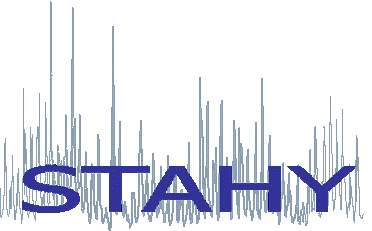
Upcoming online workshops
In our role as an official partner of the World Water Quality Alliance, IAHS would like to draw your attention to two upcoming online workshops:
MONITORING PLASTICS IN RIVERS AND LAKES: Guidelines for the Harmonization of Methodologies.
Date: June 17, 2021 at 1:30 PM EAT (12:30 PM CEST).
The guidelines contain the most current procedures for monitoring and analyzing plastic content in rivers, lakes, reservoirs and water/wastewater treatment plants. The harmonization of monitoring methods and techniques will allow for synthesis of data and will provide knowledge of transport processes, loads and impacts of plastic debris in freshwater bodies/ecosystems, that can be used to monitor water quality and also strengthen evidence base for guiding effective policymaking. The webinar will feature a panel of expert speakers and will provide the audience with an overview of the publication, practical use and implementation of the guidelines, as well as opportunities to put them into practice.
Register via the website: https://attendee.gotowebinar.com/register/5721038690869826316.
RIVER BASIN SEDIMENT MONITORING AND MANAGEMENT
Date: September 6-10, 2021
The free workshop under the umbrella of UNESCO’s International Sediment Initiative (ISI) aims at providing knowledge on:
River sediment measurement and monitoring techniques
River sediment data analysis methods
Transferring river sediment monitoring results to management solutions
This workshop will concentrate on monitoring and management of sediment in rivers. The workshop is organized in collaboration with the Federal Institute of Hydrology (BfG), UNESCO-IHP and the International Research and Training Centre for Erosion and Sedimentation (IRTCES, Beijing, China).
Application deadline: June 20, 2021
Website: http://isi.irtces.org/isi/NewsEvents/comimgevents/webinfo/2021/05/1619300941493185.htm
Upcoming 2021 Summer Schools
IAHS would like to draw your attention to a selection of hydrology related summer schools which may be of interest. Please contact the organisers directly for information using the relevant links.
Principles, Applications And New Frontiers In Isotope Geochemistry. 14-18 June 2021 at Lake Como School of Advanced Studies, Italy
The school deals with isotopes in multiple worlds of geochemistry. One of the topics is environmental isotopes in hydrology.
https://paig.lakecomoschool.org/ .
Summer School: Extremes In Water Science. 11-17 July 2021 at Villa Colombella, Perugia, Italy
The Summer School will focus on advances in statistical theory and applications dealing with extremes in Earth System Sciences, and particularly in Water Science.
http://warredoc.unistrapg.it/en/events/2020-summer-school/
Hydro-JULES Summer School. 12-16 July 2021 UKCEH Wallingford, UK (online event)
The intention is to train undergraduate, post-graduate, early-career and other international junior scientists from the fields of water and the environment, land surface science, water resources, ecology, hydrometeorology, biogeochemistry and other related research areas concerned with the delivery of next-generation land-surface and hydrological predictions.
https://hydro-jules.org/hydro-jules-summer-school-2021
12th Annual Catchment Science Summer School. 29 August - 03 September 2021 University of Birmingham, UK (online event)
The course is designed for PhD students and Post Docs in catchment science. The course is taught by Jeff McDonnell, Chris Soulsby, Jan Seibert, Ilja van Meerveld, Doerthe Tetzlaff, David Hannah, Stefan Krause and many others. It is co-sponsored by the Global Institute for Water Security at the University of Saskatchewan, the University of Aberdeen, University of Zurich and Humboldt University.
https://water.usask.ca/hillslope/teaching/catchment-science-summer-school.php#ClassDescription .
Reminder: IAHS Digital Platform Innovation Call
As a worldwide learned society IAHS has always facilitated collective epistemological progress, knowledge capitalization and scientific dialogue, through the mechanisms of networking, sharing and debating on emerging topics and through agenda-setting initiatives. In line with our parent bodies IUGG and ISC (formerly ICSU), IAHS has always been proactive in bridging divides and defending values, which are now reframed in the Open Science principles *.
The demographics and practices of the community are changing, the digital revolution is accelerating, and the current pandemic induces both constraints and innovations.
To reinforce IAHS’s values - for the community and fed by the community - we are inviting ideas for the Association’s digital acceleration. To coincide with its centenary, IAHS wishes to implement a web platform and software system to effectively link and display global hydrological knowledge and scientific findings, and to facilitate new networking and knowledge management.
Systems could involve existing and/or new products and could potentially address some of the following requirements:
1. Graphic display of hydrological case studies from each continent, with community input
2. Overview of ongoing hydrological activities and scientific achievements
3. Opportunity for data sharing
4. Ability to link groups and foster scientific collaboration
5. Internal community building within and between IAHS Commissions and Working Groups
6. Engagement of and with partners, stakeholders and citizens
7. Framework for displaying and linking projects involved in the Panta Rhei and Unsolved Problems in Hydrology (UPH) initiatives
8. Evolution and innovation over time to provide an on-going platform and archive
To enable the Association to brainstorm ideas for this community-led strategic shift, submit your outline suggestions and aspirations by June 15th 2021 by email to [email protected]
* See the actual intergovernmental process on Open Science, coordinated by UNESCO, to which we contribute via ISC, https://en.unesco.org/science-sustainable-future/open-science
